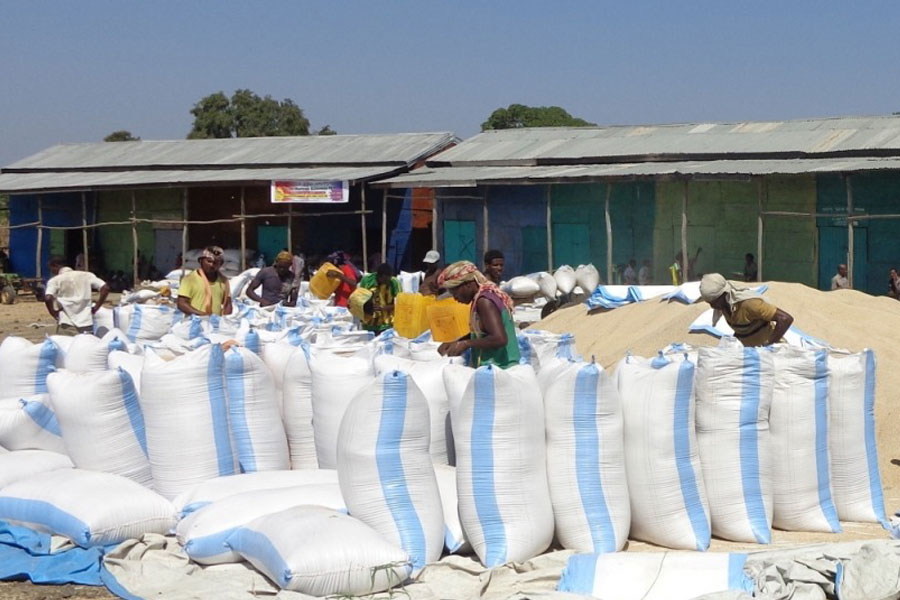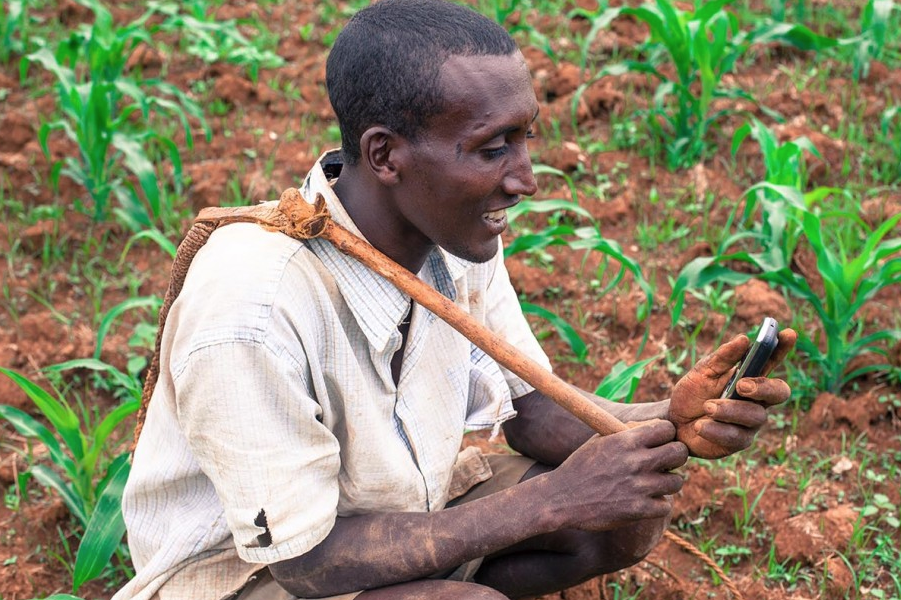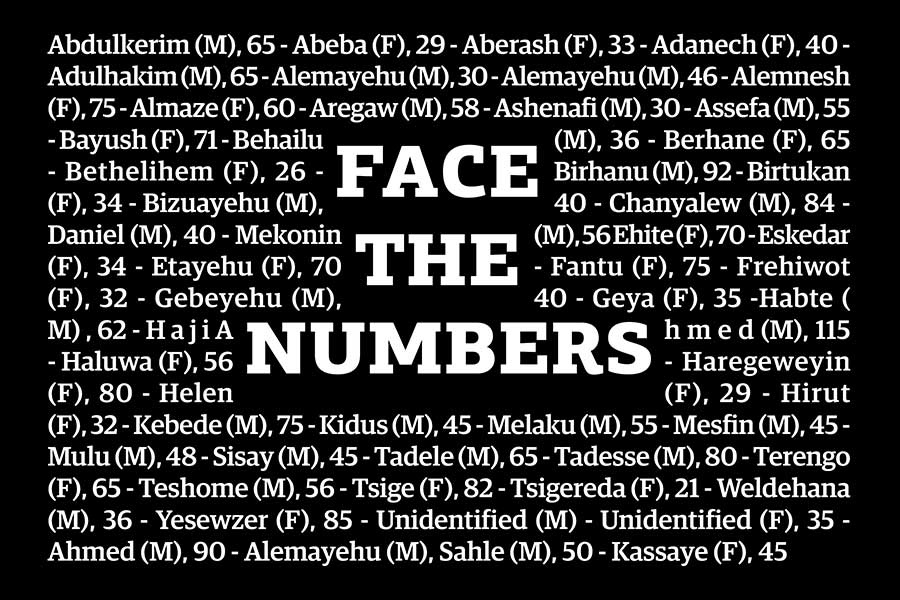
Radar | Jan 05,2019
Oumer Hussein, minister of Agriculture, has successfully navigated the bureaucratic maze to facilitate billions of Birr in subsidies from federal coffers, sufficient to slash fertiliser prices by a quarter.
Fertiliser prices in the global market have been soaring since 2020, but Russia's war in Ukraine pushed them to new highs. Smallholder farmers in Ethiopia faced retail prices of up to 4,900 Br a quintal, nearly triple what they paid last year. Over eight million smallholder farmers are affected by soaring fertiliser costs.
A former head of the Oromia Urban Development and Agriculture bureaus, Oumer has been haggling with officials of the Ministry of Finance to secure 15 billion Br in federal subsidies. The first batch of NPS fertiliser procured from the Morocco-based OCP Group arrived at ports in Djibouti last January, part of the 780,000tn the company supplies Ethiopia this year. However, the Ethiopian Agricultural Businesses Corporation (EABC) paid 650 dollars for a tonne of NPS, more than double the average of 280 dollars last year.
The price of Urea bought from FertiGlobe, an Abu Dhabi-based firm, has also surged to 1,000 dollars a tonne after an initial offer of 710 dollars. Two months ago, FertiGlobe agreed to supply half a million tonnes.
Appeals from Minister Oumer and his colleagues at the Agriculture Ministry grew more pronounced as farmers showed reluctance to buy fertiliser owing to the high costs. When the Minister wrote a letter to the Finance Ministry in April, farmers had bought only half of the 1.4 million quintals of fertiliser available in the Oromia and Amhara regional states.
Mezgebu Mekonnen, deputy manager of Damot Union, has his office headquartered in Bure, West Gojjam of the Amhara Regional State. One of the 30 unions operating in the regional state, Damot comprises 77 cooperatives and 173,000 farmers. It has thus far received 40,000tn of fertiliser, less than 13,000tns it had requested. However, Mezgebu saw farmers' reluctance to buy fertiliser due to high prices.
Last week, State Minister for Finance Eyob Tekalign (PhD) asked Abie Sano, president of the state-owned Commercial Bank of Ethiopia (CBE), to advance 15 billion Br to cover subsidies until federal legislators approve the federal budget for the coming fiscal year. The cost has been included in the budget bill tabled before Parliament.
The CBE has been financing the procurement of 1.2 million tonnes of fertilisers for distribution for the coming Mehir season. The Bank had advanced over 50 billion Br for fertilizer procurements.
Oumer's deal with Eyob is a relief for regional administrators urging federal officials to action.
“The federal government acted quickly,” said Mengistu Tesfa, director of agricultural inputs marketing at the Ministry of Agriculture.
Last week, Sofia Kassa (PhD), a state minister for Agriculture, informed six regional agricultural bureaus heads and their agricultural inputs supply cooperative agencies to make price adjustments. For many, it came on time.
“It isn't late,” said Ajebe Sentayehu, deputy head of the Amhara Agriculture bureau.
No less than 4.6 million smallholder farmers in the Amhara Regional State harvested close to four million tonnes of teff and wheat last harvest season. The volume represents a quarter of the 11.2 million tonnes of teff and wheat harvested nationwide. Around 540,000tn of fertiliser stock has thus far made it to the region, two-thirds of which has been distributed to farmers.
Damot Union began selling fertiliser with the adjusted price last week; a quintal goes for around 3,500 Br.
“The subsidy will have an impact," Mezgebu told Fortune. "The planting season for wheat and teff has yet to arrive.”
Lemma Dagabassa, a lecturer at Haromaya University's School of Plant Sciences, agreed with Mezgebu on the early arrival of fertilizers for teff and wheat. However, he cautions the planting season for crops like maize has already passed.
“Regional governments and unions should distribute the available stock to farmers before the planting season approaches,” urged Lemma.
Out of the 1.3 million tonnes of NPS and Urea the Corporation bought for the coming harvest season, 77pc has reached warehouses of cooperative unions responsible for the distribution.
“The OCP Group has supplied all of the NPS,” said Gashaw Aycheluhim, communications director. “The fertiliser is being distributed to farmers.”
Two-thirds of the Urea supplied by FertiGlobe has also arrived. The remaining is scheduled to arrive next week, according to the Communications Director.
Fertiliser has been slow to make into farmers' hands in the Oromia Regional State, where demand is estimated at 840,000tn. Over half has arrived at the warehouses of 61 unions active in the regional state. Less than half of the stock has been distributed to farmers.
“The delivery rate has been slow,” conceded Mejera Regassa, agricultural inputs supply and distribution expert at the Oromia Cooperative Agency.
Lome Adama Farmers' Union, which has 115 cooperatives and 65,000 farmers, has been selling a quintal of fertiliser for 4,800 Br. Its managers made price adjustments last week.
“We're discussing how to go about it,” said Kassaye Charu, deputy general manager.
The Union needs 16,000tn of fertiliser this year. Its members have received around half.
Eshatu Tadesse, a father of seven, has a hectare of land in Adama Wereda. He rented extra five hectares from his neighbours to expand wheat and teff farming for the next harvest season. He bought three quintals of fertiliser from the Union, each costing him 4,850 Br.
Farmers like Eshatu who bought fertiliser before the subsidy came will be reimbursed, officials pledged.
“I need two more quintals to farm the land I rented,” Eshatu told Fortune.
PUBLISHED ON
Jun 18,2022 [ VOL
23 , NO
1155]

Radar | Jan 05,2019

Fortune News | Nov 27,2018

Election 2021 coverage | Jan 13,2020

Radar | Jun 19,2021


Agenda | May 13,2023

Editorial | Dec 07,2019

Fortune News | Mar 09,2019

Fortune News | Jun 14,2020

Letter To Editor | Apr 18,2023

Dec 22 , 2024 . By TIZITA SHEWAFERAW
Charged with transforming colossal state-owned enterprises into modern and competitiv...

Aug 18 , 2024 . By AKSAH ITALO
Although predictable Yonas Zerihun's job in the ride-hailing service is not immune to...

Jul 28 , 2024 . By TIZITA SHEWAFERAW
Unhabitual, perhaps too many, Samuel Gebreyohannes, 38, used to occasionally enjoy a couple of beers at breakfast. However, he recently swit...

Jul 13 , 2024 . By AKSAH ITALO
Investors who rely on tractors, trucks, and field vehicles for commuting, transporting commodities, and f...

Oct 18 , 2025
The political establishment, notably the ruling party and its top brass, has become p...

Oct 11 , 2025
Ladislas Farago, a roving Associated Press (AP) correspondent, arrived in Ethiopia in...

Oct 4 , 2025
Eyob Tekalegn (PhD) had been in the Governor's chair for only weeks when, on Septembe...

Sep 27 , 2025
Four years into an experiment with “shock therapy” in education, the national moo...